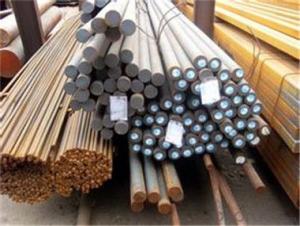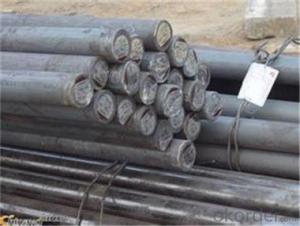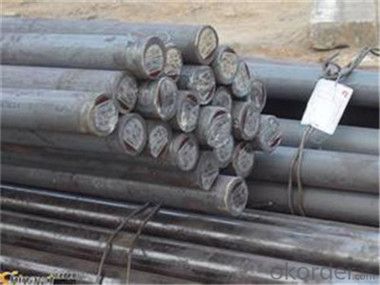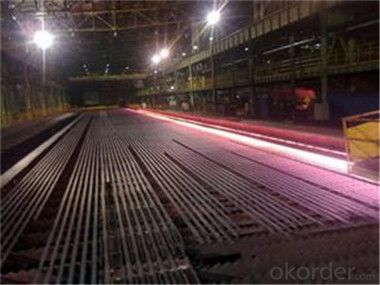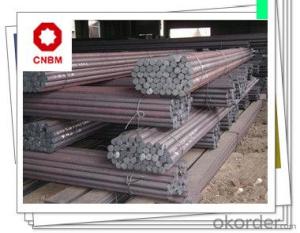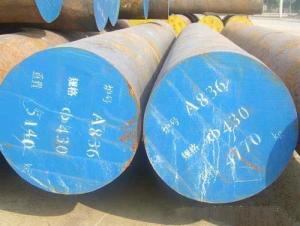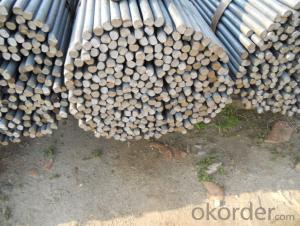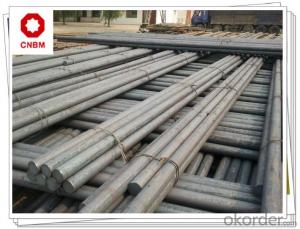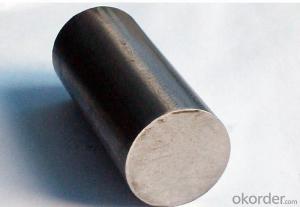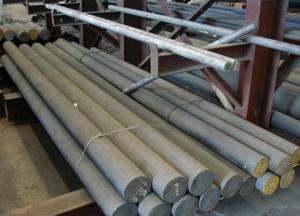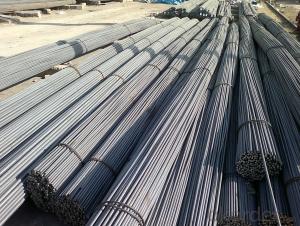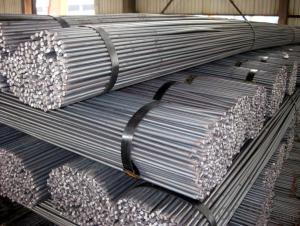Carbon Steel Round Bar for Hydraulic Cylinders
- Loading Port:
- Tianjin
- Payment Terms:
- TT OR LC
- Min Order Qty:
- 66 m.t.
- Supply Capability:
- 2000000 m.t./month
OKorder Service Pledge
OKorder Financial Service
You Might Also Like
Description of steel round bar:
1. Commodity: Round steel bar
3. Technical: Hot rolling
2. Length: Min. 5.8meter, according to requirement.
3. Diameter: 16mm-250mm
5. Packing: In Bundle or according to your requirements.
Festures of steel round bar:
1.Dia 80-800mm Length:2000-13000mm or as required
2.Technique:Forged
3.Delivery Time:45 days
Specifications of steel round bar:
Carbon steel rod applies to chemical industry, shipping industry,manufacturing industry,construction,decorate Industry,electric power,pump shafts, sanitary wares,furniture handles,boil,high temperature resistant,low temperature resistant, corrosion resistant.
Chemical Composition
| C | Mn | Si Max | S Max | P Max |
| 0.40-0.50 | 0.60-0.90 | 0.035 | 0.035 | 0.035 |
Images of steel round bar:
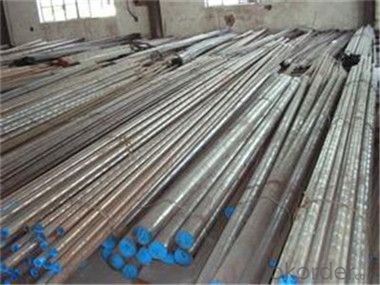
FAQ:
1. What is your package?
Packing situation: standard seaworthy packing or as customer required.
2. How long is the lead time?
Delivery time: 45 days after order confirmed.
3. What payment term do you accept?
Payment: T/T or L/C at sight.
- Q: What are the different types of steel used in manufacturing round bars?
- There are several types of steel used in manufacturing round bars, including carbon steel, alloy steel, stainless steel, and tool steel. Carbon steel is the most common type, known for its high strength and affordability. Alloy steel contains additional elements such as chromium, nickel, and molybdenum to enhance its properties like corrosion resistance and toughness. Stainless steel is highly resistant to corrosion and can withstand high temperatures, making it ideal for applications in the food and chemical industry. Tool steel is specifically designed for tools and dies, offering high hardness, wear resistance, and toughness.
- Q: What is the resistance to fatigue of a steel round bar?
- The resistance to fatigue of a steel round bar refers to its ability to withstand repeated loading and unloading cycles without experiencing failure or damage. This property is typically evaluated through fatigue testing, where the bar is subjected to a controlled number of stress cycles. The resistance to fatigue of a steel round bar depends on various factors such as the material composition, heat treatment, surface finish, and the presence of any defects or discontinuities.
- Q: Are steel round bars prone to fatigue failure?
- Yes, steel round bars are generally prone to fatigue failure due to cyclic loading and repeated stress, especially when exposed to high loads or stress concentrations. However, factors such as material quality, design, and proper maintenance can help mitigate the risk of fatigue failure.
- Q: How do you prevent corrosion on steel round bars?
- There are various effective methods available for preventing corrosion on steel round bars: 1. Coating: A commonly employed technique involves applying a protective coating, such as paint or epoxy, on the steel round bars. This coating acts as a barrier between the steel and the external environment, preventing contact with moisture and corrosive substances. 2. Galvanization: Another effective approach is to galvanize the steel round bars by adding a layer of zinc on the surface. This zinc layer acts as a sacrificial anode, corroding instead of the steel in case of damage. This method is particularly beneficial for preventing corrosion in outdoor or marine environments. 3. Stainless steel: Utilizing stainless steel round bars with a high chromium and nickel content is another effective way to prevent corrosion. The presence of these elements creates a passive, protective film on the steel's surface, acting as a barrier against corrosion. 4. Proper storage: It is crucial to store the steel round bars in a dry and well-ventilated area to prevent corrosion. Moisture, especially in humid surroundings, can accelerate the corrosion process. Therefore, it is important to ensure that the round bars do not come into direct contact with water or any other corrosive substances. 5. Regular maintenance: Regularly inspecting the steel round bars for corrosion signs and promptly addressing any issues can prevent further damage. This may involve cleaning the bars using appropriate methods and applying protective coatings when necessary. By implementing these preventive measures, the occurrence of corrosion on steel round bars can be significantly reduced, ensuring their durability and preserving their structural integrity.
- Q: Can steel round bars be used in the power generation industry?
- Yes, steel round bars can be used in the power generation industry. Steel round bars are commonly used in the construction of power generation equipment and infrastructure due to their high strength and durability. They are often utilized in the fabrication of turbine shafts, generator rotors, gears, and other components that require high load carrying capacity and resistance to wear and fatigue. Additionally, steel round bars can be easily machined and welded, making them a versatile material for various applications within the power generation industry.
- Q: Can steel round bars be used for making engine parts?
- Yes, steel round bars can be used for making engine parts. Steel round bars are often used in the manufacturing of engine components due to their high strength, durability, and resistance to heat and corrosion. They can be machined into various shapes and sizes to create engine parts such as crankshafts, camshafts, connecting rods, and valves. The use of steel round bars ensures the required mechanical properties and structural integrity needed for engine performance and reliability. Additionally, steel round bars can be heat-treated and surface-treated to further enhance their properties, making them suitable for engine applications.
- Q: What are the different grades of steel used in round bars?
- There are various grades of steel used in round bars, each with its own unique properties and applications. Some commonly used grades include: 1. Mild Steel (Grade 1018): This is a low carbon steel with good machinability and weldability. It is often used in general engineering applications, such as construction, automotive, and machinery. 2. Carbon Steel (Grade 1045): Carbon steel is a medium carbon steel with high tensile strength and good wear resistance. It is commonly used in shafts, axles, gears, and other high-stress applications. 3. Alloy Steel (Grades 4140, 4340): Alloy steels contain additional elements such as chromium, molybdenum, or nickel to enhance their mechanical properties. These grades offer excellent strength, toughness, and wear resistance and are often used in applications that require high strength and durability, such as automotive parts, aircraft components, and industrial machinery. 4. Stainless Steel (Grades 304, 316): Stainless steel is a corrosion-resistant steel that contains a minimum of 10.5% chromium. It is widely used in various industries, including food processing, chemical, and medical, due to its excellent corrosion resistance, heat resistance, and aesthetic appeal. 5. Tool Steel (Grades A2, D2): Tool steels are specifically designed to have high hardness, wear resistance, and toughness. They are commonly used in the manufacturing of cutting tools, dies, and molds. These are just a few examples of the different grades of steel used in round bars. The selection of the appropriate grade depends on the specific application requirements, including strength, corrosion resistance, heat resistance, and machinability.
- Q: Are steel round bars suitable for the production of hydraulic cylinders?
- Steel round bars are indeed appropriate for manufacturing hydraulic cylinders. Steel is renowned for its robustness, longevity, and resistance to corrosion, thus making it an exceptional option for hydraulic purposes. Due to their exceptional tensile strength and capacity to endure substantial loads and pressure, steel round bars are frequently employed in the construction of hydraulic cylinders. Furthermore, steel can be effortlessly machined and welded, enabling accurate production and customization of hydraulic cylinders. In summary, steel round bars possess the essential attributes and capabilities needed for manufacturing hydraulic cylinders.
- Q: What are the different testing methods used for steel round bars?
- Steel round bars undergo various testing methods to guarantee their quality and suitability for different applications. These methods encompass: 1. Visual Inspection: In this preliminary step, the bars are visually assessed for any discernible defects, such as cracks, surface irregularities, or incorrect dimensions. 2. Dimensional checks: To verify their diameter, length, and straightness, steel round bars are subject to dimensional scrutiny. Accurate measurements are imperative to meet specified requirements. 3. Ultrasonic Testing: Internal defects like cracks, voids, or inclusions are detected by passing ultrasonic waves through the round bars. This method identifies potential weaknesses that could compromise the bars' structural integrity. 4. Magnetic Particle Inspection: By utilizing a magnetic field and magnetic particles, this method identifies surface and near-surface defects like cracks, seams, or laps. It is especially advantageous for ferromagnetic materials like steel. 5. Dye Penetrant Inspection: This technique involves applying a colored dye to the round bars' surface and subsequently wiping it off. The dye seeps into any surface cracks or defects, making them visible under ultraviolet light. 6. Hardness Testing: To gauge the hardness of steel round bars, hardness testing is conducted using methods like Rockwell or Brinell scales. It assists in determining the material's ability to withstand external forces and ensures compliance with required hardness specifications. 7. Tensile Testing: This test measures the maximum load a steel round bar can bear before fracturing, providing insight into the material's strength and ductility. 8. Chemical Analysis: Chemical analysis is performed to ascertain the composition of the steel round bars, including the presence of elements like carbon, manganese, sulfur, phosphorus, and others. It guarantees adherence to the required chemical composition standards. These testing methods are vital in ensuring that steel round bars meet industry standards and customer requirements in terms of quality, reliability, and compliance. Employing a combination of these tests is essential to ensure overall quality and performance in various applications.
- Q: Can steel round bars be used in the manufacturing of pumps?
- Yes, steel round bars can be used in the manufacturing of pumps. Steel round bars are commonly used in various industries for their strength, durability, and versatility. In pump manufacturing, steel round bars are often used as shafts or rotors due to their ability to withstand high pressure and rotational forces. The steel round bars can be machined, forged, or heat-treated to meet the specific requirements of the pump design. Additionally, steel round bars provide excellent corrosion resistance, making them suitable for pumps used in various environments. Overall, steel round bars are a reliable and commonly used material in pump manufacturing.
Send your message to us
Carbon Steel Round Bar for Hydraulic Cylinders
- Loading Port:
- Tianjin
- Payment Terms:
- TT OR LC
- Min Order Qty:
- 66 m.t.
- Supply Capability:
- 2000000 m.t./month
OKorder Service Pledge
OKorder Financial Service
Similar products
Hot products
Hot Searches
Related keywords
